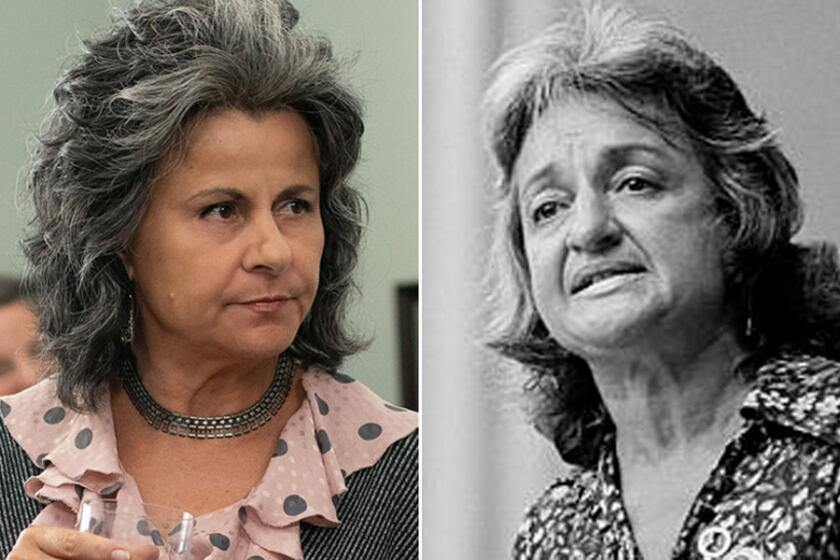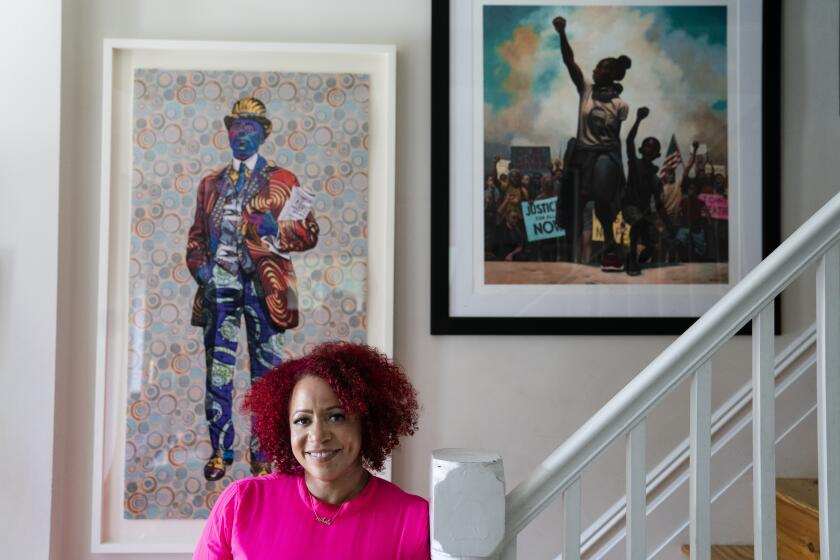Rafia Zakaria’s ‘Against White Feminism’ is ‘not a scolding but an invitation’
- Share via
On the Shelf
Against White Feminism
By Rafia Zakaria
Norton: 256 pages, $24
If you buy books linked on our site, The Times may earn a commission from Bookshop.org, whose fees support independent bookstores.
“In 2018, this book wouldn’t have been possible,” said Rafia Zakaria. “I first showed it to my agent at the time. He just said, ‘Absolutely not, nobody’s going to publish it.’ One time that I brought it up, I was told to not even use the word ‘white.’ ”
Her (now-former) agent’s warning only reinforced the problem she wanted to write about. “Against White Feminism,” published Aug. 17, was driven by Zakaria’s own experiences as a Pakistani American civil rights attorney, activist and writer who, despite bylines in CNN, the Guardian and the New York Times and two previous books, had always felt excluded from the mainstream feminist conversation.
“If I stay in my corner and just write about South Asia or brown women, then I can be tolerated,” said Zakaria, whose first book was “The Upstairs Wife: An Intimate History of Pakistan.” “If I dare to write about white women, the mistakes they might be making, and how they can do better, then I’m persona non grata.”
Enough has changed in the last three years — the backlash to “Girlboss” culture, deeper debates about inclusiveness after the George Floyd protests — to get “Against White Feminism” a fair hearing among readers interested in broadening the feminist perspective. Zakaria sharply critiques the Betty Friedan-descended “trickle-down feminism” that has long dominated politics, tracing the “agenda of colonialism” in empowerment narratives and challenging white women’s support for existing power structures.
“I feel a sense of responsibility,” said Zakaria, “to say the things that other women ... can’t say because they don’t have the platform.” Zakaria spoke to The Times about the virulence of “lean-in culture,” what white feminism gets wrong about Afghanistan and why “excising whiteness” doesn’t mean excluding white women. This conversation has been edited.
In Leigh Stein’s new novel, “Self Care,” pioneers in “the wellness space” backstab each other, in a satire that already feels 100 years old.
How long has “Against White Feminism” been in the works?
It’s been a long wait. It’s not only that the book is being published, but it’s also that the audience for this book exists at this point. There are enough younger people of all races who realize that if we cannot talk about race within feminism, we are going to lose feminism altogether. I’m very intentionally trying to provide an alternative history of the feminist movement. The way the story has been told has alienated so many women of color who have the same aspirations and intentions but who don’t want feminism to be conflated with whiteness.
You wrote that the goal is not to expel white women from feminism but to “excise whiteness.” What does that mean in practical terms?
I think the justice potential of feminism as a movement — versus feminism as a brand — needs to be reclaimed and rekindled. The “lean in” definition of [getting] ahead at any cost, elbows out, who cares who you trample on, has definitely hurt women of color. White women have defined feminism in a very individualistic way and not been bothered by who they are oppressing in their own struggle to overcome male oppression. It has created the myth that it is somehow not possible to be successful and fulfilled without pushing other people out of the way. That’s simply not the case. There are inspirational possibilities within a meaningful sisterhood where you’re not constantly trying to outdo each other. Those can only be accessed if there’s a very intentional attempt to excise whiteness and the strains of capitalism that run within it.
Chapter 4 is titled “White Feminists and Feminist Wars,” on the ways white feminism is weaponized for warfare. It seems highly relevant in the context of Afghanistan.
One of the things at the core of white feminism is the reduction of Black, brown, and other women of color and their bodies to props that essentially uplift the white woman as the ultimate feminist. White women very much bought into the idea that this kind of trickle-down feminism was going to be exported from the United States to Afghanistan. Now, all this concern about Afghan women seems to suddenly have erupted among Americans, but America has been bombing Afghanistan for 20 years. Afghan women don’t only need schools, they also need their family members to stay alive, and you’ve been killing them at stunning rates, and no one has said anything about it. I find it very disingenuous and honestly depressing, because in 20 years, it appears that there has been no progress beyond, “Oh, my God, they’re putting women in burqas.” It’s just ludicrous.
We sort through what’s fact and what’s fiction in “Mrs. America” Episode 4, “Betty.”
What do you hope to accomplish with these essays?
I know that if someone puts the time into reading the book, their perspective will change. How I envision it in my head is like the antidote to gaslighting. I want all the women of color who read the book to be able to see that this is not in their heads. I don’t believe that all white feminists are malicious, [but] I do think that there’s a number of white women who just haven’t examined their complicity with these oppressive, patriarchal, capitalist structures.
If they can read the book, they can find the tools [for both] self-examination and engaging in larger debate. The book is not a scolding but an invitation. If the title is provocative, it’s provocative because we have to become comfortable with referring to white culture, white feminism and the use of whiteness — not as this invisible sort of mainstream — but rather become comfortable with the language of differences, talking about differences and being able to transcend differences, instead of pretending that they’re not there.
Do you think solidarity is possible for us women of color with white women? Who do you believe has the responsibility of bridging that?
I think that it’s possible, but we are at a transformational moment right now. Aspects of our life have drastically changed in the past year and a half. I think that there’s a possibility for meaningful conversation. The sense of entitlement that white men had has been tragically absorbed by white women in their quest to become equal to white men. If we don’t call that out right now, I don’t think we’ll ever be able to get rid of it. It requires white women to come to it with open minds and also realize that women of color have accrued scar tissue from decades of being sidelined. I don’t purport to know all the solutions, but I am willing to be the punching bag, so to speak, for people. I don’t mind if they criticize me so long as they start the conversation.
Howard University students and faculty welcome Nikole Hannah-Jones, believing she will benefit both the university and the journalism she fights for.
More to Read
Sign up for our Book Club newsletter
Get the latest news, events and more from the Los Angeles Times Book Club, and help us get L.A. reading and talking.
You may occasionally receive promotional content from the Los Angeles Times.









